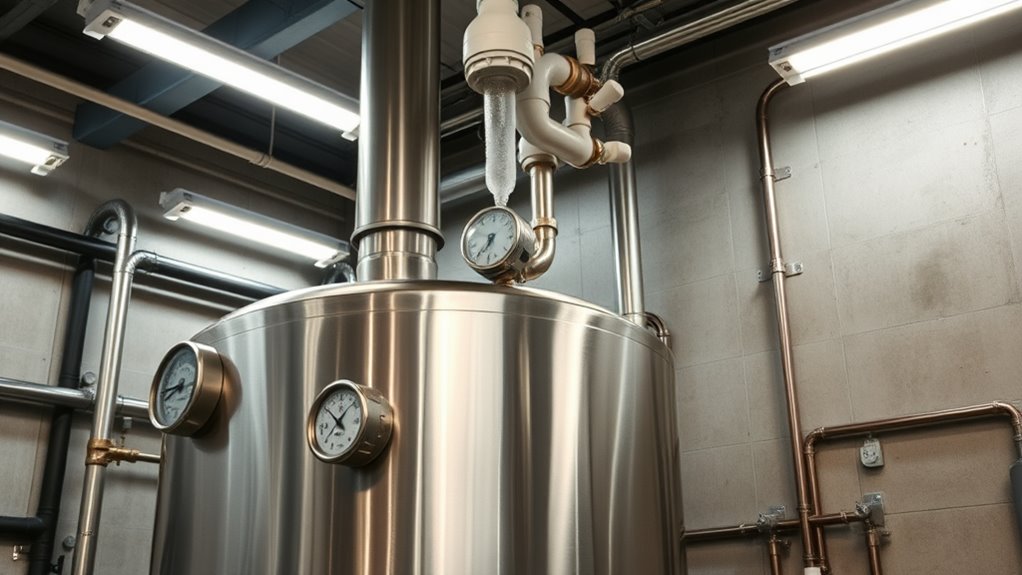Commercial buildings typically use various boiler types, including fire-tube, water-tube, and electric boilers, each tailored for specific heating demands. Fire-tube boilers are efficient at lower pressures, while water-tube boilers excel in high-pressure situations. Electric boilers are compact and suited for smaller spaces. Modular systems enhance flexibility and efficiency. When choosing a boiler, consider factors like fuel type, sizing, and maintenance needs to guarantee peak performance. Explore further to discover more about selecting the right boiler for your building.
Key insights
- Commercial buildings commonly utilize fire-tube, water-tube, electric, and modular boilers based on their specific heating needs and operational demands.
- Fire-tube boilers are efficient for lower pressure applications, while water-tube boilers are ideal for high-pressure environments.
- Electric boilers offer a space-saving solution with low emissions, suitable for smaller applications.
- Modular boilers provide flexibility and scalability, allowing for independent operation during varying demand levels.
- High-efficiency and condensing boiler systems significantly reduce energy costs and enhance performance over time.
Types of Boilers Used in Commercial Buildings
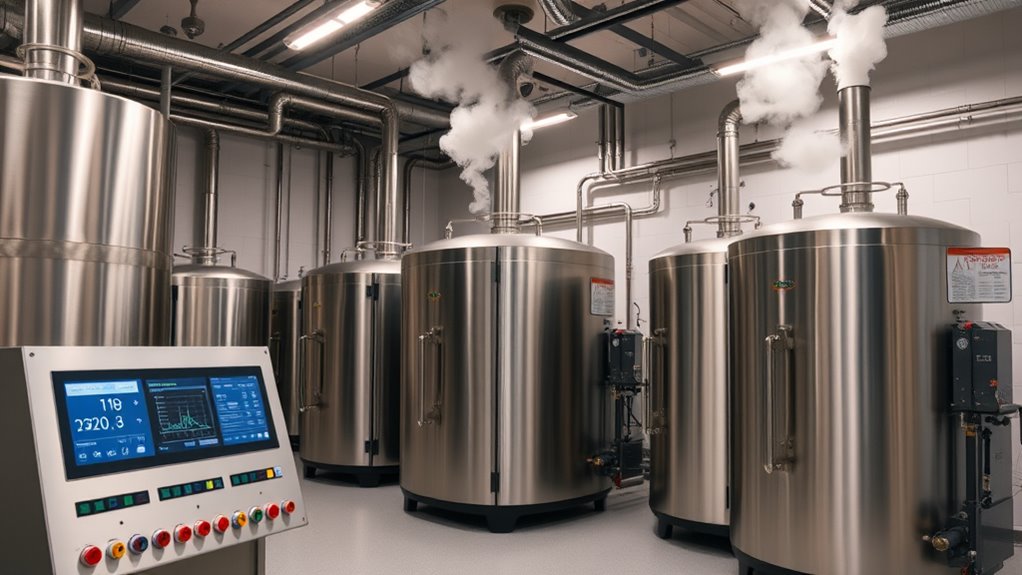
When selecting a boiler for a commercial building, understanding the various types available is essential to meet specific heating requirements. You'll encounter several boiler types, including fire-tube, water-tube, and electric boilers, each suited for different industrial applications. Fire-tube boilers are efficient for lower pressure needs, while water-tube boilers excel in high-pressure environments, offering rapid steam production. Electric boilers are ideal for smaller applications where space is limited and emissions need to be minimized. Additionally, modular boilers provide flexibility and scalability, making them suitable for varying demands. By analyzing the specific heating needs of your commercial space, you can determine the most appropriate boiler type, optimizing performance and efficiency for your operations. Furthermore, considering energy efficiency in your selection process can lead to significant cost savings and reduced environmental impact.
Advantages of Different Boiler Systems
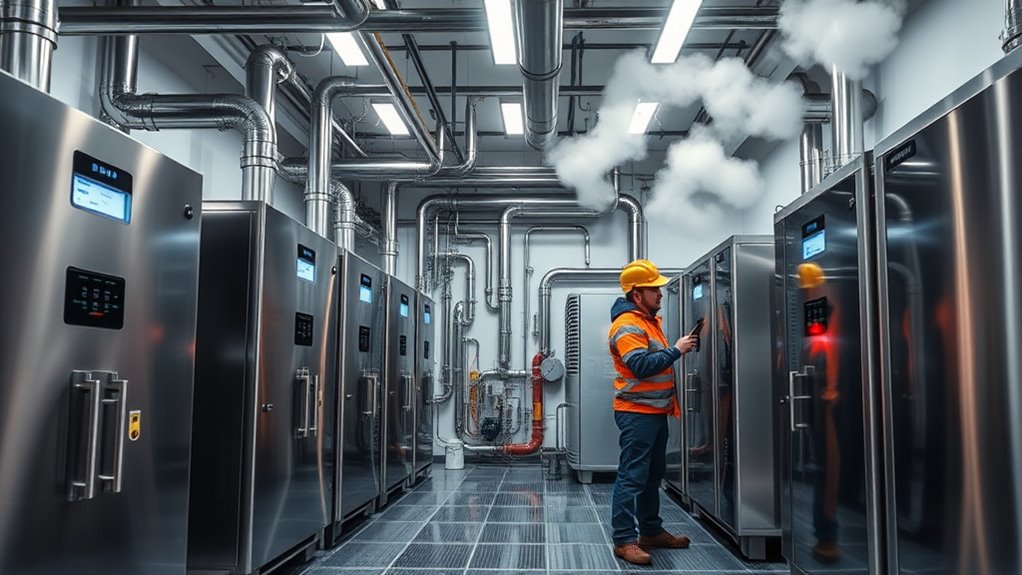
Choosing the right boiler type not only impacts heating efficiency but also brings specific advantages tailored to different operational needs. For instance, high-efficiency boilers can greatly reduce energy costs, ensuring better boiler efficiency over time. When you opt for a modular boiler system, you enhance system reliability, as these units can operate independently, minimizing downtime during maintenance. Additionally, condensing boilers extract more heat from combustion gases, boosting overall efficiency and reducing emissions. On the other hand, steam boilers offer rapid heating capability, ideal for high-demand environments. By understanding these advantages, you can select a boiler system that aligns with your building's requirements, optimizing both performance and energy savings while ensuring long-term reliability. Furthermore, integrating systems such as commercial heat pumps can provide an energy-efficient heating and cooling solution that complements traditional boiler systems.
Factors to Consider When Choosing a Boiler
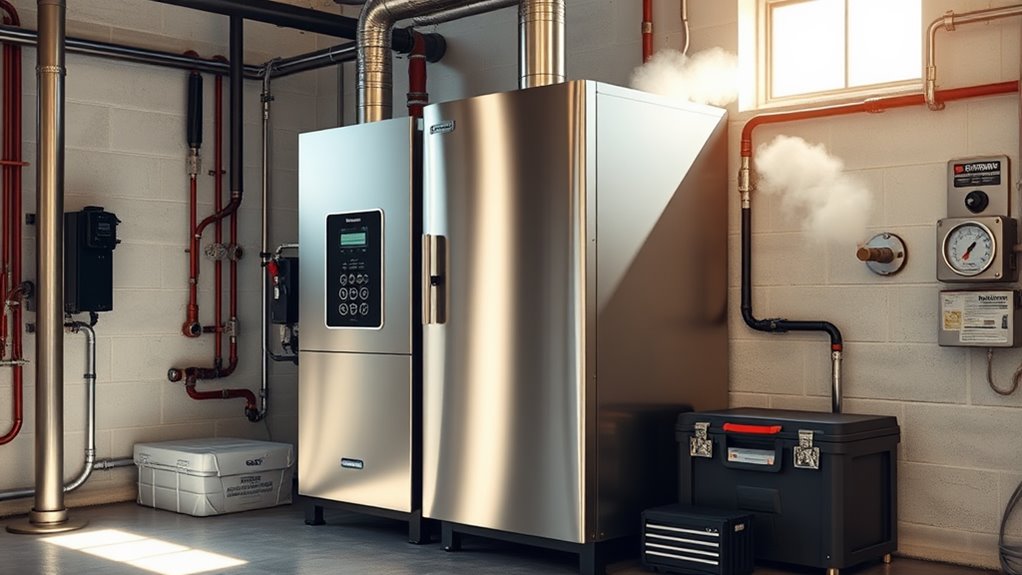
What key factors should you consider when selecting a boiler for your facility? First, focus on boiler sizing; confirming the unit matches your heating demands is vital. An improperly sized boiler can lead to inefficiencies or inadequate heating. Next, evaluate fuel types. Different boilers operate on natural gas, oil, or electricity, and your choice may depend on availability, cost, and environmental regulations. Additionally, consider the boiler's efficiency rating, as this affects operational costs over time. Finally, think about installation and maintenance requirements, as some systems may necessitate specialized skills or additional infrastructure. By weighing these factors, you'll guarantee your boiler meets your facility's unique needs effectively and economically. Regular servicing ensures safe and efficient operation, which is crucial for compliance with safety standards.
Maintenance and Efficiency of Commercial Boilers
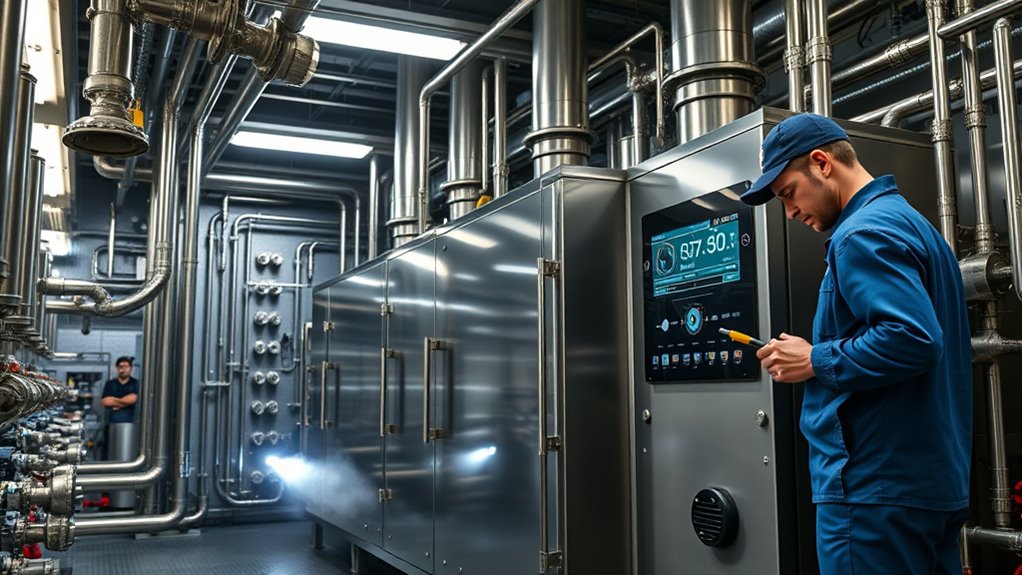
To guarantee peak performance and longevity of commercial boilers, regular maintenance is essential. You should implement a systematic approach that includes routine inspections, cleaning, and necessary repairs. This proactive boiler maintenance not only minimizes unexpected breakdowns but also enhances energy efficiency. By confirming components like burners, heat exchangers, and flues are in prime condition, you can greatly reduce energy consumption and operating costs. Additionally, consider monitoring combustion efficiency and adjusting settings to maximize performance. Neglecting maintenance can lead to inefficiencies and higher energy bills, underscoring the importance of a disciplined maintenance schedule. Regular service by qualified technicians will guarantee your boiler operates at peak efficiency, ultimately extending its lifespan and improving overall building performance. Furthermore, regular inspections in plant rooms are critical for compliance with safety regulations and ensuring the systems operate safely.
Case Studies: Successful Boiler Applications in Businesses
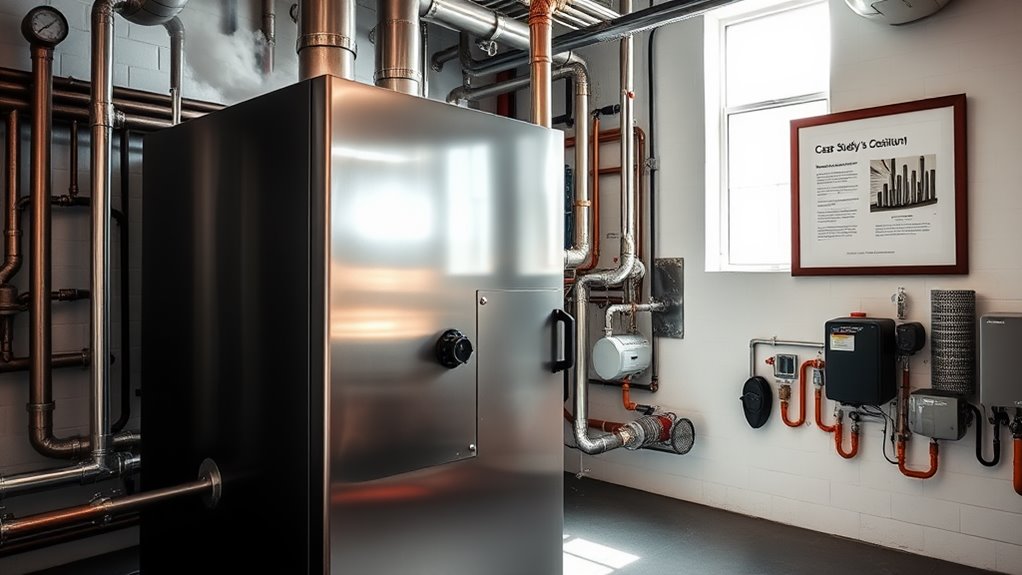
While numerous businesses rely on commercial boilers for their heating needs, the effectiveness of these systems often shines through in specific case studies that highlight their successful applications. For instance, a large hotel implemented a high-efficiency boiler system, achieving a 20% reduction in energy costs while maintaining ideal comfort levels. This case study demonstrates significant boiler efficiency gains, directly impacting the hotel's bottom line. Another example is a manufacturing facility that upgraded to a modular boiler system, allowing for greater scalability and improved performance during peak demand periods. These case studies emphasize the importance of selecting the right boiler system tailored to each business's unique requirements, illustrating how strategic investments in boiler technology can lead to substantial operational savings and enhanced reliability. Additionally, regular power flushing is crucial for maintaining these systems, preventing performance degradation and reducing energy costs.
Frequently Asked Questions
How Long Do Commercial Boilers Typically Last?
Commercial boilers typically last between 15 to 30 years, depending on various factors. Your boiler lifespan can be notably extended with proper maintenance practices, such as regular inspections and timely repairs. Neglecting maintenance can lead to reduced efficiency and premature failure. By staying proactive with upkeep, you not only guarantee peak performance but also maximize your investment, ultimately saving you costs related to replacements or unexpected breakdowns.
What Is the Average Cost of Installing a Commercial Boiler?
When considering the average cost of installing a commercial boiler, you'll need to account for several installation factors. Typically, you're looking at a range from $5,000 to $20,000. The cost breakdown includes equipment, labor, and any necessary permits or modifications. Factors like boiler type, building size, and location can greatly influence the overall price. It's crucial to get detailed quotes to understand the specific costs involved in your project.
Are There Any Government Incentives for Upgrading Boilers?
Yes, there are government incentives for upgrading boilers, especially those that improve boiler efficiency. By investing in a more efficient system, you not only enhance energy savings but may also qualify for tax credits or rebates. These incentives can greatly offset installation costs, making it financially viable to upgrade. Always check local and federal programs to maximize your benefits, ensuring your investment aligns with energy conservation goals.
What Safety Features Should Commercial Boilers Have?
When evaluating boiler safety, you should guarantee your commercial boilers comply with safety regulations. Key safety features include pressure relief valves, automatic shut-off systems, and low-water cutoffs. These elements help prevent dangerous situations, such as explosions or overheating. Additionally, incorporating flame monitoring and safety interlocks can enhance operational security. Regular inspections and maintenance are essential to keep these safety features functioning effectively, guaranteeing a safe environment for your operations.
Can Boilers Be Used for Both Heating and Hot Water?
Yes, boilers can be used for both heating systems and hot water. Many modern commercial boilers are designed to provide efficient heat for your space while simultaneously supplying hot water for various applications. They achieve this through a system that integrates heating and hot water production, allowing you to optimize energy use. By utilizing a single boiler for both functions, you can enhance efficiency and reduce operational costs in your building.
Summary
In conclusion, choosing the right boiler for your commercial building is essential for efficiency and reliability. By understanding the various types available, along with their advantages, you can make an informed decision that meets your specific needs. Consider factors like maintenance requirements and operational efficiency to guarantee peak performance. Learning from successful case studies can further guide your choice, assuring your boiler system supports your business operations effectively and sustainably.

